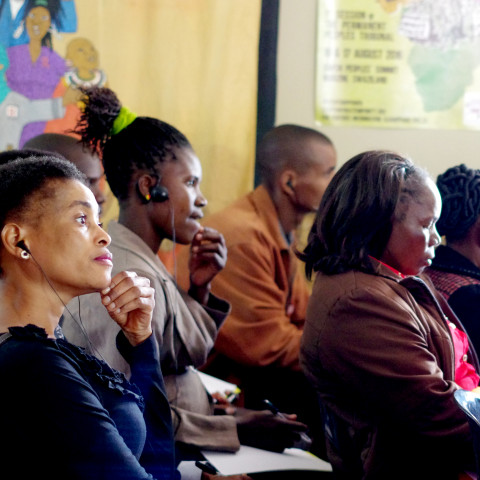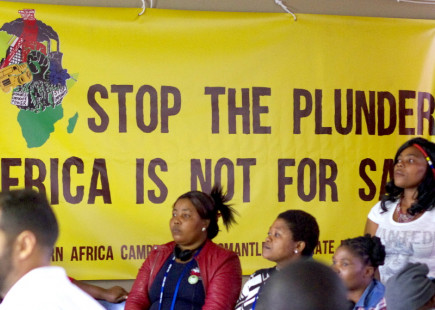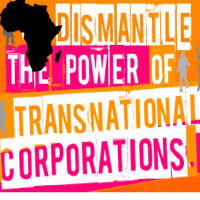The striking platinum mineworkers in Marikana and the resistance of the Amadiba community on the sand dunes of South Africa’s east coast have brought international attention to corporate impunity in Africa 1. But these headlines are only the most visible evidence of a deeply rooted resistance across Southern Africa to the daily reality of a corporate agenda of devastation, destruction of livelihoods, and mining for profit.
This organised and growing resistance to an economic and political corporate paradigm was brought to the first Hearing of the Permanent Peoples Tribunal (PPT) on TNCs in Southern Africa, held from August 16-17, as part of the Southern African Peoples Solidarity Network (SAPSN) Summit in Manzini, Swaziland 2. The resistance struggles of communities from Zambia, Zimbabwbe, Mozambique, Swaziland and South Africa heard in the testimonies illustrated the encounters and convergence of corporate struggles.
Encounters Across National Boundaries
The encounters at the PPT Hearing went far beyond Southern Africa – though it was significant to see how far people had traveled from across the region. The Hearing brought together for the first time communities affected by widespread corporate human rights violations and crimes – revealing a pattern of similar and widespread violations of human and environmental rights. Testimonies came from many different sectors; women, farmers, mine workers, artisanal miners, and bricklayers who defend their rights, territories, land and natural resources from corporate extractivism and demand a decent and dignified life.
Contesting the mythology of ‘development’
Several testimonies demonstrated and contested the myth of ‘development’ as promised by both TNCs and governments. Many of the cases illustrated the divergence of the 'development' promise of improved livelihoods and opportunities, and community schools, from the lived reality of massive dispossession, forced re-locations, diversion of rivers poisoned by mercury or other toxics, lands made infertile and inaccessible, widespread air and environment contamination causing serious injury to health and death, and ancestral and children’s graves bulldozed out of existence.
Southern Africa Open for Business
Huge advertisement boards announcing the 36th Southern Africa Development Community (SADC) Summit, scheduled to take place on August 22-23, lined the highway from the International Airport to the center of Manzini. The summit's theme was ”Enriching Nations and Enhancing Integration”. All the testimonies at the PPT Hearing contested this mythology. The peoples of Southern Africa have not given up on a people-based regional integration and are determined to continue to challenge their governments, who have turned the opportunity of independence and self-determination into a neo-colonial nightmare and destruction of vast natural resources.
Facts confronting Figures-Growth for whom?
A Swaziland newspaper, The Business Express Swaziland (BE), widely available on news stands and hotel coffee tables carried the KPMG Global CEO Outlook for 2017 with the headline “CEOs See a Brighter Future’. According to the BE, “Swaziland’s closest economic ally-for instance-South Africa had 90% of its CEOs under the [KMPG] survey express confidence to realise growth in their companies over the next three years…Reflecting on the 2016 World Economic Forum Outlook report released in April, the baseline projection in 2016 stands at 3.2%, with global economic recovery projected to strengthen in 2016 and beyond” 3. Within the testimonies at the PPT Hearing however, the constant question was 'growth for whom?' And complementary to the testimonies, expert witnesses provided evidence that growth figures are massively in favour of the TNCs that dominate extractivism in the region.
The UK Lonmin corporation at the core of South Africa’s Marikana platinum miners' struggle for a living wage, made billions in profit in the years preceding and during the 2012 strike. The AIDC Report “The Marikana Massacre and the Bermuda Connection” 4 quoted during the Tribunal indicated that this ‘wage evasion’ corporate strategy was achieved through a complex web of mechanisms including tax havens and colluding international auditing firms that facilitated illicit capital outflow practices. As is widely known, 34 striking miners were massacred at Marikana on August 16, 2012 5. In the same year of the strike, the Report indicates that Lonmin transferred more than R300 billion (€18.5 billion) from South Africa and could have easily met the R12,500 (€771) a month wage demanded by the platinum rock drillers. Additionally, pleading a lack of resources, Lonmin only delivered 3 show houses of the 5,500 promised to the miners and their families.
Similar facts were presented in another Report from War on Want referring more broadly to the practices of the mostly British 101 TNCs in the extractive industries listed on the London Stock Exchange. At current market prices, these corporations control a majority of Africa’s resources -$ 305 billion (€270 billion) worth of platinum, $276 billion (€246 billion) worth of oil and $216 billion (€193 billion) worth of coal. 6
The figures in these two Reports are underpinned by a recent UNCTAD Report on Trade Mis-invoicing, by Professor Leonce Ndikumana 7.The Report includes an analysis of four African countries, Nigeria, Cote d’Ivoire , Zambia and South Africa, as well as Chile. Its conclusion pinpoints the implications of massive under-invoicing in the case of South Africa as ‘pure smuggling of gold out of the country’. In other words, virtually all gold exported by South Africa leaves the country unreported 8.
The role of Free Trade Agreements (FTAs) including the Economic Partnership Agreements (EPAs) between the EU and the SADC member states as well as Bi-lateral Investment Agreements was also in focus at the Tribunal and in the Southern Africa People's Solidarity Network (SAPSN) Workshops. These corporate driven agreements, together with the role of the structural adjustment policies of the IMF and World Bank and the trade liberalisation demands of the WTO have brought intensifying impoverishment and asymmetrical trade relations to the Southern Africa Development Community Countries 9. It was not only the EU member states and European corporations that were highlighted during the Tribunal - corporations from the BRICS states were also reported to reproduce similar operations of dispossession and impunity. 10
Communities Reclaim a life of dignity and Demand Access to Justice
Throughout the testimonies presented at the Tribunal, TNCs in the SADC region were reported to operate with impunity and with the complicity of governments. The cases of the affected communities demonstrated that corporate injustice and crime has been met with a yawning gap in responsibility and accountability. Repeated demands and initiatives seeking justice have been frustrated. Four years after the Marikana massacre, the relatives of the slain miners have been denied access to justice, as demonstrated in a remembrance ceremony at the Tribunal. The Tribunal heard testimony that Community law, Constitutional law and international human rights law are frequently over-ridden and affected communities and their leaders criminalised. A major factor contributing to this is the international fortress of Free Trade Agreements, including the Economic Partnership Agreements (EPAs) between the European Union (EU) and SADC as well as the mechanisms and policies of the IMF, World Bank and the WTO, which have reproduced what some commentators call a global corporate rule providing an architecture of impunity for TNC operations in Southern Africa and other regions. 11
From Manzini to Geneva
The PPT affirms the role of affected commuities as protagonists to develop law from below. This is in the tradition of the PPT, which takes the Declaration of Algiers (1976) on the Rights of Peoples as its founding inspiration and which had Ruth First of South Africa as one of its first Vice Presidents 12. Returning to Africa for the first time on its 40th Anniversary, the PPT in this Hearing in Manzini aimed “to give recognition, visibility and a voice to the people suffering violations of their fundamental rights…” 13 .
Among the strongest messages in the testimonies at the PPT was the repeated demand for access to justice. Many of the movements and organisations participating in this first PPT Hearing, as well as those at the SAPSN Peoples Summit, are participating in the international network and global campaign for a UN Treaty 14 with binding rules for TNCs and other business enterprises. These Southern African communities are determined that their demands for access to justice will be heard at the second Session of the Open Ended Inter Governmental Working Group (OEIGWG) in Geneva this coming October 22-29, 2016.
The Southern African encounters in Manzini are indeed among the voices singing a new song of resistance and solidarity in the growing confrontation with corporate power and impunity. 15
End notes
1. Award winning Film Documentaries – Miners Shot Down (Marikana) https://www.youtube.com/watch?v=cbvHU3wxj4E and Shore Break (Amadiba community in the Xolobeni area) https://vimeo.com/ondemand/theshorebreak have had an important role in this.
2. Southern Africa PPT Newsletter: http://www.stopcorporateimpunity.org/wp-content/uploads/2016/07/Souther…
3. Business Express Swaziland (BE) https://www.facebook.com/Business-Express-Swaziland-965144580267808/?fr…
4. Business Express Swaziland (BE) https://www.facebook.com/Business-Express-Swaziland-965144580267808/?fr…
5. Forslund, D (2015) The Bermuda Connection: Profit Shifting, Inequality and Unaffordability at Lonmin 1999-2012, AIDC Capetown, South Africa http://aidc.org.za/download/Illicit-capital-flows/BermudaLonmin04low.pdf
6. Nicolades, G. Eyewitness News, August 16, 2016 Four Years On and No Changes for the Community, http://ewn.co.za/2016/08/16/Today-marks-4-years-since-Marikana-massacre
7. Curtis, M. The New Colonialism: Britain’s scramble for Africa’s energy and mineral resources War on Want ,July 2016 http://www.waronwant.org/media/new-report-british-companies-leading-new…
8. Ndikumana, L. (July 2016) UNCTAD Report http://unctad.org/en/PublicationsLibrary/suc2016d2.pdf
9. Quoted in the Great Rip Off –South Africa loses billions in export misinvoicing Ashley, B., & Forslund, D., August 2016 http://ccs.ukzn.ac.za/default.asp?2,40,5,3625
10. Chizarura, Lodwick (2014), EPA Update Policy Brief – Seatini, Zimbabwe: “In most cases within our countries there is a small powerful export-oriented lobby group that advocated for the signing of the EPAs so that their business interests are not disrupted, e.g the tobacco industry in Zimbabwe, beef producers in Namibia and sugar producers in Swaziland. This is done despite the harmful effects of the agreement to the wider and less powerful economic sectors employing the majority of the population”.
11. Hernandez Zubizarreta, J., (2015) https://www.tni.org/en/briefing/new-global-corporate-law
12. The Permanent Peoples Tribunal (PPT) was established in Bologna in 1979, as a direct continuation of the Russell Tribunals on the Vietnam War (1966-67) and the Latin America dictatorships (1973-1976). http://tribunalepermanentedeipopoli.fondazionebasso.it/?lang=enhttp://t…
13. Message from Helen Jarvis, Vice President of the PPT to the Hearing in Manzini on TNCs in Southern Africa, August 2016, https://www.tni.org/en/article/message-from-the-presidency-to-the-openi…
14. Call to Reclaim Peoples Sovereignty http://www.stopcorporateimpunity.org/how-to-be-involvedparticipate-in-t…
15. This song of new struggles was among the challenges laid out by veteran activist M.P. Giyose of Jubilee South when he delivered his welcome message at the opening of the Manzini PPT: http://aidc.org.za/southern-africans-speak-tribunal-dismantle-corporate…





